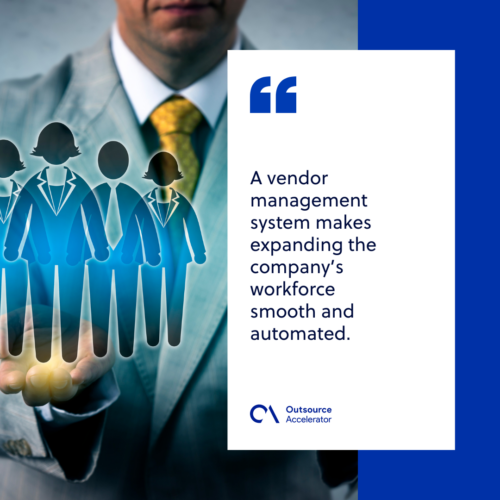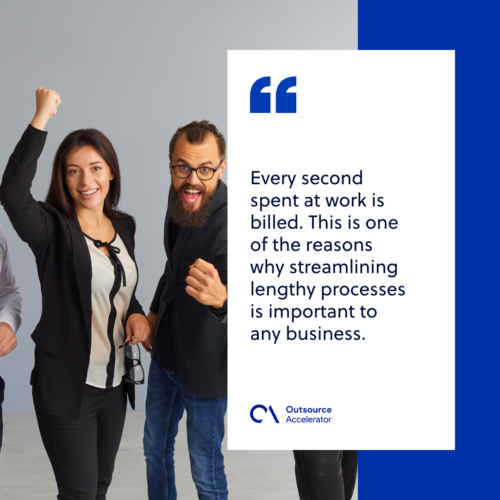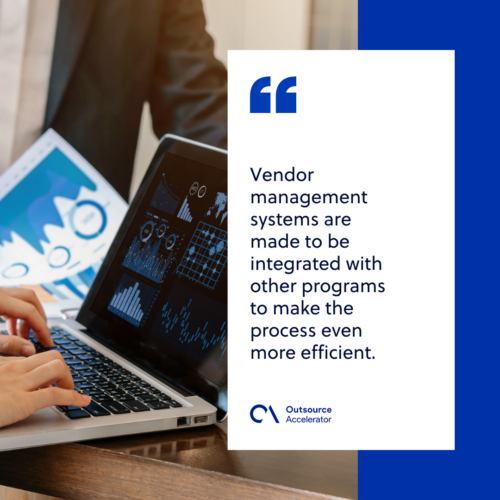Why your business should have a vendor management system this 2026

A vendor management system (VMS) allows businesses, primarily those in the staffing industry, to manage, organize, and track their recruiting partners, open job orders, and other processes.
VMS platforms are mostly web-based, with the users only needing a working device and a strong internet connection to navigate it.
Companies often invest in vendor management systems to streamline their recruiting process. Without them, businesses would have a hard time expanding their workforce.
How does a vendor management system work?
To put it simply, a vendor management system makes expanding the company’s workforce smooth and automated. With the help of the system, recruiting is faster, easier, and cost-effective.
- The system collects active job orders and acquisitions from different recruiting agencies and staffing firms.
- It automates the sourcing and collection of relevant résumés and curriculum vitae.
- VMS produces data that can be easily digestible for reporting purposes.
Oftentimes, VMS platforms help companies in managing contingent workers like freelancers, independent remote contractors, consultants, and non-permanent employees.

3 reasons to use a vendor management system
Most, if not all, companies that procure their workers from staffing agencies use a vendor management system. Their needs and goals vary, but here are the top reasons to help you decide whether your business needs this tool.
Increased efficiency and productivity
Talent acquisition is a time-consuming process, not to mention requiring a lot of effort and work for both parties involved.
With a system, procuring new contingent or contract workers is more efficient. Recruiters and hiring managers can now focus on their core responsibilities other than hiring external talents.
Cost-effectivity
Let’s say that a startup company wants to hire independent contractors, but they don’t have any means to pull together a hiring team in a timely manner. Their next option is to get their contractors via a recruiting firm.
In order to be successful with the project without going over the budget, the startup company in this scenario needs to invest in a vendor management system.
Streamlined processes
Every second spent at work is billed. This is one of the reasons why streamlining lengthy processes is important to any business. With a program like a vendor management system, employee acquisition has never been easier.

Who uses a vendor management system?
With the exception of enterprises that hire workers through staffing agencies, most users of the program are in the staffing and recruitment sectors.
Staffing agencies
These firms are service providers for companies and organizations that need positions filled as soon as possible. Oftentimes, they work with multiple clients throughout the whole recruitment cycle.
Recruitment process outsourcing (RPO) companies
RPO companies utilize tech and programs that help them fill up positions faster and without having to charge their clients more.
They also oversee their clients’ full recruitment and talent acquisition process, just like a staffing agency. One major difference between RPO companies and staffing agencies is that the former often follows service-level agreements (SLA).
Things to look for in a vendor management system (2026 checklist)
Once you’ve decided that your business can benefit from having a vendor management system, here’s a checklist of things you need to consider when exploring options.
Plug-and-play system
Is the system easy to set up? Is there 24/7 support available for any problems that may arise? For any system that will be deployed to a workplace, these questions should be answered before making the decision.
User-friendliness
If we’re being honest, not all employees are technically-inclined. It’s why user-friendly interfaces are important, no matter what system or application it is.
The VMS will be used by anyone in the hiring team, both by experienced users and newbies. An easy-to-use interface will make all the difference.
Pricing
Some of these programs aren’t exactly inexpensive. But when it comes to quality, it’s better to choose a more expensive one that has more features and a top-notch security protocol.
Easy integration
Vendor management systems are made to be integrated with other programs to make the process even more efficient.

For instance, the VMS can connect to these applications and programs:
- Accounting and bookkeeping software
- Human resource information system (HRIS)
- Time-tracking tools
- Enterprise resource planning (ERP)
Choosing the right VMS provider
The right VMS provider will make the company’s talent acquisition process easier, not to mention it will change the flow of the old system for good.
So, before jumping the gun and deciding on a solution provider, it’s best to consult with the affected parties, such as the recruitment team, human resources, and the training department.
Keeping the process of acquiring a new platform transparent is key to a better workplace.







 Independent
Independent




